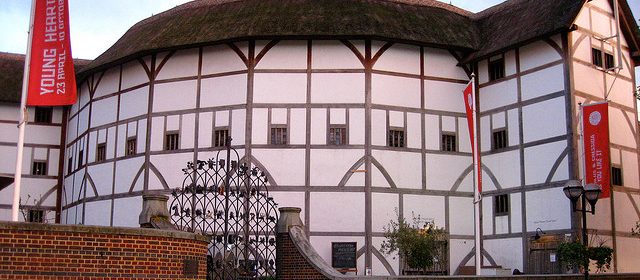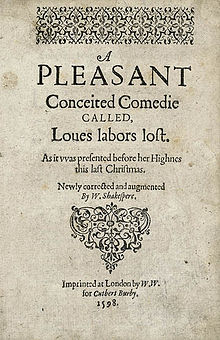I completely get why some may be put off, but here is why I think you should give it a go.
Every year I go and see at least one play by Shakespeare at the Globe. I love Shakespeare and have (in one form or another) seen all of his plays – lets not get into the cannon discussion but I include The Two Noble Kinsman. If you’ve never been and are in London (at a time when viruses are not playing havoc with society) I’d highly recommend an evening at The Globe Theatre. Tickets are very reasonably priced especially if you are standing. Personally I always book well in advance and get a seated ticket, you’re not in the main crowd for the fun and danger of being picked on by the actors, but at least you can sit down and as some of the plays can be long it’s worth the extra money.

It’s all academic at the moment anyway as they have, reasonably and understandably, currently shut their doors to the public until further notice. 2020 will be a gap in my unbroken record of many years where I have seen a play there at least once (it’s not the only thing that I have an annual tradition of that will be missing this year). It didn’t have to be because as well as the outdoor theatre for summer performances there is the very cool Sam Wanamaker Playhouse, an indoor intimate theatre for telling tales in the winter season, and I could have gone in January to see something.
However that doesn’t mean we can’t enjoy Shakespeare, there is the Globe Player (https://globeplayer.tv/) where you can stream from a catalogue of previous performances, it’s well worth it! Other theatre groups and performances are available and also worth looking out for, the RSC have teamed up with companies hosting streamed plays for example and there are some excellent options.

The suggestion of Shakespeare can turn people off, maybe they had to wade through it at school, or they are put off by the old language. I fully get that this can be overwhelming but I would still recommend you to watch at least one play to try it out. I say watch because for many who read it they find it hard to follow, this is because it’s not supposed to be read, it’s a play, it’s supposed to be watched. There is joy in reading the texts but this is not how William intended the public to access his work (yes I did just refer to him by his first name!). The scripts were meant for the actors so they could perform it.
The next question then is which play to see? There are around thirty-nine of them so just taking one at random can be fun, but as some are heavier going than others if you start with one that isn’t quite your thing you might be put off. Of course it all comes down to what you like. A few years ago the BBC had a success with the English Historical plays, broadcasting them as films in two cycles of three parts. Using well known actors these, although long, were very watchable and again if you are able to see them somehow you really should.

Going under the umbrella title of The Hollow Crown the second cycle (about the Wars of the Roses) is a great entry point, the last of the three films is an adaption of Richard III with Benedict Cumberbatch in the title role, this is one of my favourite plays anyway but this adaption still had me on the edge of my seat. If you’re thinking you are not a fan of history, I’d say although this is history (with a lot of poetic licence) it’s as compulsive viewing as many a period drama.
“Now is the winter of our discontent
Made glorious summer by this sun of York;
And all the clouds that lour’d upon our house
In the deep bosom of the ocean buried.”
― William Shakespeare, Richard III
If that is still sounding a little hard going some of the Comedies are shorter and lighter work. Personally two of my favourites are Love’s Labours Lost –four students vow to give up seeking women so they can focus on study… then they meet the new neighbours and that vow suddenly seems hard work – the Globe version on their Player had me keep having to pause it as I laughed so much at various points, and The Comedy of Errors – deliberately confusing cases of mistaken identity as two sets of twins (who were separated at birth) all happen to end up in the same city at the same time but don’t know it… and much hilarity ensues. The Comedy of Errors is his shortest play; to put that in context Hamlet (one of the most well known plays) is his longest at over twice the length!
“They have been at a great feast of languages, and stolen the scraps.”
― William Shakespeare, Love’s Labour’s Lost

Although there is a lot of concepts about exactly what a Shakespeare play is, when you investigate you can see how diverse they are. The old idea of putting them all in one of the three categories of Comedy, Tragedy, and Historical doesn’t really work as many of the plays blur those lines. Earlier I said there are around thirty-nine plays, the reason there isn’t an exact number is because there is discussion over what counts as a Shakespeare play; some were co-written, for others he was part of a team of writers and may have only contributed a little and there are cases where for a couple of plays it’s not exactly certain how much involvement he did have. To be honest if you are just wanting to be entertained I don’t think that’s something worth worrying about, most of the obvious ones are by him so there is no conspiracy here, something I’ll go on to discuss in the second part of this blog.
At the end of day the idea that Shakespeare is boring, I believe, is because many were forced to read the dry texts at school and then analysis them. This is, as I said, not what was intended when they were written. To enjoy Shakespeare you need to watch it live, we can’t really do it that at the moment but I highly recommend tracking down at least one of his plays online, you may discover it’s a lot more entertaining than you realised.
Buy The Complete Works Of William Shakespeare
Watch Shakespeare’s Plays
Follow My Blog
Get new content delivered directly to your inbox.
